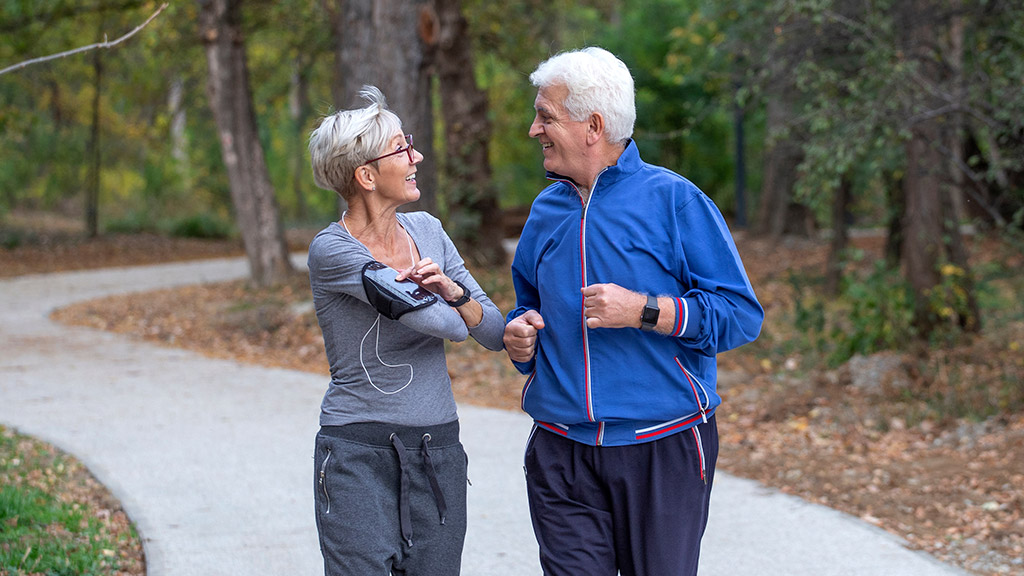Good physical health has many benefits. Not only does it enable us to live longer and fight off illness, but it also affects us in many of the other holistic areas that we looked at in Chapter 1. When we are healthy, we tend to have more energy to devote to social and intellectual pursuits
By the end of this chapter, you will understand:
- The basic requirements for good physical health
- The importance of nutrition, hydration, exercise and oral health care 3 How to report changes in the person’s physical condition
- How to promote a healthy lifestyle.

Good health is not just about our physical condition. As we saw earlier, a holistic view of a person considers other areas.
The basic requirements for a person in good health include:
- Adequate fluids
- Exercise
- Good hygiene
- An enjoyable lifestyle
- Good health
- Good mental health
- Good nutrition
Nutrition
A good diet is one of the most important factors contributing to good health and quality of life. Food and mealtimes are also important to our social and cultural routines. Many older people you support may have small appetites, have problems with swallowing or do not have access to a good diet. These means that malnourishment is common in older people.
Malnutrition increases the risk of pressure sores, falls and fractures. It shortens the person’s life expectancy and leaves them with low and a lower quality of life. Older people can need more protein, calcium and vitamin D than many younger people.
Fibre is important to help reduce constipation, which can be a major problem for many older people and people with physical disabilities. Vegetables, grains and fruits are all excellent sources of fibre. Prunes and liquorice and fibre supplements stirred into a drink are great ways to boost fibre. Protein builds muscle strength, reduces the chance of falls and helps the person to stay active. It also plays a part in wound healing and restoring damaged cells. Meat, chicken, fish, eggs, cheese, milk, custard and beans are all good sources of protein. Calcium is needed for bone strength. Full cream dairy options contain more calcium than low fat. They include milk, yogurt and cheese. Vitamin D works with calcium to increase bone strength. We get most of our Vitamin D from the sun, but it is also in foods such as fish, margarines and milk products.
Note
Australian Dietary Guidelines recommend minimum quantities of certain foods. These recommendations include:
- 2 1/2 serves of meat, chicken fish or eggs every day
- 3 to 4 serves of calcium rich foods (such as milk, cheese, yoghurt or ice-cream) per day
- 3-4 serves of breads, cereals, rice and noodles per day
- 2 serves of fresh, frozen, canned or dried fruit each day
- 5 serves of vegetables, nuts or seeds each day.
Case Study
Gail supports Betty, a frail lady who lives in her own home. Gail knows that Betty has a small appetite and that she has lost weight recently. This could have a serious effect on Betty’s physical wellbeing. Gail talks to her manager about some options for helping Betty to increase her appetite. Together with Betty and her husband, they work out the following, which will be added to the individualised plan:
- Help Betty to stimulate her appetite by supporting her to walk a short distance before meals
- Offer Betty small meals more frequently; Betty enjoys finger foods and custards
- Reheat Betty’s food regularly if it has gone cold while helping her to eat
- Betty’s husband will help to organise a visit to the dentist to make sure that Betty’s dentures are fitting well.
Hydration
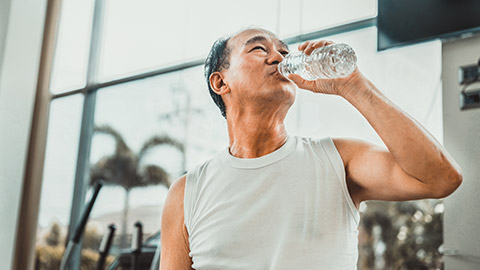
A healthy person has at least 2 litres (6-8 cups) of water or other liquids per day. Hydration helps to regulate body temperature, prevent infections, keeps our organs functioning properly and can also regulate our body temperature.
Other benefits of staying hydrated include:
- Relieving fatigue
- Flushes out toxins in our body
- Improves the complexion of our skin
- Helps to maintain regularity
Dehydration on the other hand, happens when there is a loss of more fluid that is taken in and our body doesn’t end up having enough fluids to carry out is proper functions and in turn, it can cause serious health effects.
Symptoms of dehydration can include:
- Sunken eyes
- Confusion headache
- Dry mouth and tongue
- Dark concentrated urine
- Tiredness
- Dry skin
- Constipation
Some reasons for dehydration can include:
- Swallowing difficulties
- Diarrhea or vomiting unwell with illnesses such as the flu or gastro
- Sweating in hot weather
- Not being able to see, reach for or to ask for a drink, and not getting enough help to drink regularly
- Medicines that make the person pass more urine
- Forgetting to drink, such as when the person has dementia
- Deliberately not drinking to try and avoid trips to the toilet.
Exercise
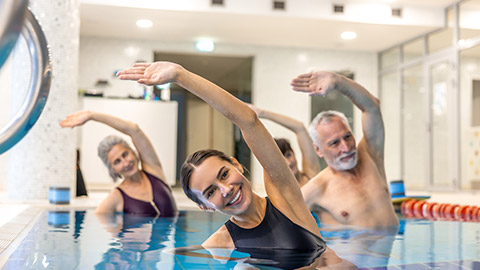
Exercise helps nearly every part of the human body (and our mind!) to function better.
Exercise can:
- Help the person to maintain a healthy weight, and reduce fat around the body’s organs such as the heart and blood vessels
- Reduce high blood pressure
- Pump blood more effectively around the body and into the tissues, providing energy to our cells and to our brain
- Work muscles and other structures to keep them strong, supple and efficient and to reduce the chance of falls
- Strengthen bone and reduce osteoporosis and fractures
- Help lift mood
- Provide the person with a purpose and an enjoyable pastime, such as sport or games
- Increase the person’s lung function and support breathing
- Increase appetite. Exercise does not have to mean high impact or energetic workouts
If the person has a physical disability, an illness or if they are frail, you can help them to tailor exercise to suit their needs and abilities.
Watch
Watch the following YouTube video from Scope to learn more about exercise for people who are disabled: ‘Exercise Classes for Disabled People – Disabled Fitness Instructor Kris’s Story – Scope Video’
Example
Here are some examples:
- The person can exercise in a chair or wheelchair, using their legs and arms if they can
- Ball games can be adapted to use a balloon instead of a ball, giving a safer and gentler form of exercise
- Walking is a very beneficial exercise for everyone; the more the person walks, the less chance they have of injury from falls
- Weight bearing exercises can be designed by a physiotherapist to help the person maintain strong and healthy bones and muscles.
Hygiene
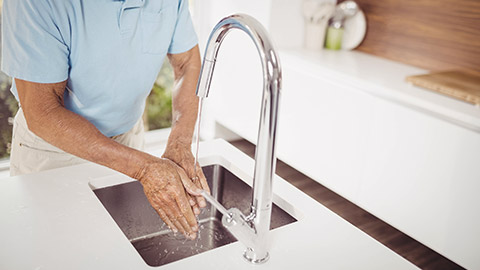
Supporting the person’s personal care needs and hygiene is often a common part of your job role. Bacteria and moisture left on the skin for long periods can lead to infections, disease and pressure sores. Hygiene includes:
- Showering, bathing or washing to remove dirt, bacteria, urine, faces and sweat from the person’s skin
- Helping the person to care for their mouth and teeth, to remove food and bacteria, and prevent ulcers, gum disease and tooth loss.
- Supporting the person with continence aids if they are required
- Bowel care. Provide personal care in line with the person’s preferences and according to their individualised plan. Remember to wear gloves when you are potentially in contact with body fluids, and to wash your hands before and after attending to the personal care needs of a person you support.
Respect the person’s privacy and confidentiality by keeping doors closed when you are attending hygiene practices. Do not ask personal questions in front of other people, including family and other visitors.
Oral Health
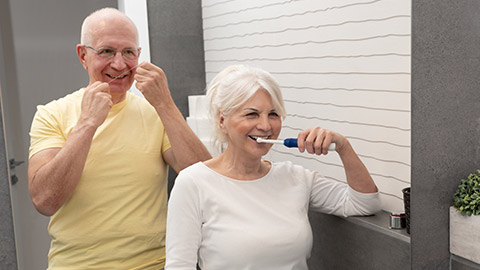
Our mouth, teeth and gums play an important role in biting, chewing and swallowing food. They help us to speak clearly and are important to our appearance and self-esteem. Dental diseases are almost entirely preventable with good daily oral care. Oral care includes:
- Helping the person to clean their teeth and dentures after each meal
- Checks of the person’s mouth and gums regularly for signs of cuts, pain or infection
- Caring for the tongue, lips and gums
- Supporting the person to have regular check-ups with a dentist
- Keeping the mouth and lips moist by making sure they have a good fluid intake
- Reporting pain or ulcers. Sugary foods and drinks, alcohol and smoking can cause damage to the enamel on teeth. If the person does want to take these things, encourage them to have a drink of water immediately afterwards. Nutrients that support healthy teeth and gums include Vitamin C and calcium. Dairy foods are the best source of calcium.
- Lemon and glycerine alcohol mouth washes and swabs are no longer recommended because of their negative effect on the teeth.
Helping a Person to Clean Their Teeth
Remember that the person should be encouraged to care for their teeth, in whatever way they are able to do themselves. When a person has dementia or has difficulty swallowing, food can sit in pockets in the mouth. The person might not be able to communicate mouth pain to you. Oral care should be performed at least twice a day, in the morning and evening. Wash your hands and wear gloves when performing oral care.
Activity
Click on the following link from Victoria Health and answer the following questions:
- How can many oral health issues be avoided?
- How many times should a resident’s oral hygiene status be monitored?
Note
It is just as important to attend to oral hygiene for people with dentures as it is for people with their own teeth. Dentures should be cleaned twice a day and be cleaned professionally on a regular basis. All dentures in an aged care facility should be marked with the person’s name. This is usually done with engraving.
In aged care and in disability, regular checks of the older person’s mouth can help to find problems. Check that:
- The person does not feel any pain in their mouth or gums
- Dentures fit well and do not rattle or click on the gums as the person moves their jaw
- Their gums are moist and pink, and not bleeding
- There are no sores, redness, ulcers or white patches
- Food is not trapped in pockets in the mouth or cheeks
- Existing teeth do not have breaks or sharp edges
- There are no signs of yellow plaque near the gums
- The mouth is moist with saliva and not dry.
Important
- Remember to document and report any problems that you notice or that the person reports with their mouth, gums or teeth.
- When a person has an intellectual disability or dementia, it can be more difficult to provide oral care, as it is natural to feel uncomfortable when another person opens or touches the mouth or teeth.
- Help to make oral care a pleasant task. Always explain what you are going to do, and encourage the person to do the parts of their care that they can do themselves. It can be useful to clean your own teeth with them, using your own toothbrush, and ask them to copy.
- Individual differences in oral care might include preferences for a different type of flavour of toothpaste, a soft or firm bristled toothbrush (soft is usually safer for older people) or using an electric toothbrush. They might ask you to follow certain procedures for cleaning their dentures. They might also have their own preferences for a choice of dentist.
Activity
How can you help a person enjoy the process of cleaning their teeth if they don’t feel like it?
- Play their favorite music
- Use praise and encouragement
- Stroking the cheek toward the mouth to help stimulate a reflex encouraging the person to relax and open their mouth
- Come back in the morning and try again
Changes in Physical Condition Reports
No one expects you to understand the full range of diseases or conditions that might affect the people you support. However, it is important that you are able to look for and report changes in health and wellbeing that might mean that the person is unwell, or that they need additional help or referral to a professional such as a GP. Signs that a person might be experiencing illness, or that they are at risk of poor health include:
- Pain or discomfort, especially if it is ongoing
- Sudden signs of confusion
- A high temperature, or feeling hot and sweaty for no good reason
- Nausea and vomiting
- Dizziness or weakness
- Rashes, redness or other skin problems
- Pale or flushed skin
- Changes in the person’s physical abilities
- Withdrawal or depression.
Your service will have a system for reporting these and other signs of illness. If you have concerns, report as soon as possible, because some signs and symptoms can deteriorate quickly, or can be indications of a serious health problem. In community settings, this will often be via a phone call to your supervisor. In a facility, this will usually be to the supervisor or nurse in charge. You will also need to document the person’s signs and symptoms carefully. Documentation helps to support your verbal report and can help to ensure that the information is passed on correctly to others such as health professionals. Documentation in community settings will often be via a form called a monitoring form or an incident and illness report. In an aged care facility, it will be via a file note in the resident’s file.
Watch
Watch Maggie Beer talk about a diet to help fight dementia: ‘The Diet to Help Fight Dementia’
Eating To Strengthen Your Mind & Fight Dementia | Studio 10 - YouTube
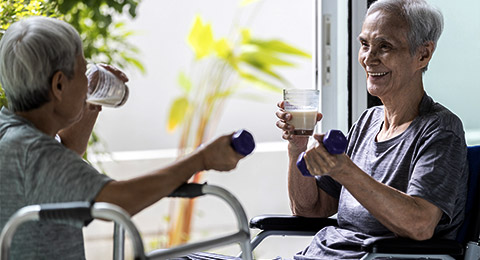
So far we have looked at the importance of nutrition, hydration and protection from infection with good hygiene practices. A healthy lifestyle incorporates all of these things. It can also mean:
- Getting enough sleep
- Seeing a GP regularly
- Not smoking
- Avoiding too much alcohol
- Getting enough exercise
- Having good social networks
- Finding things to look forward to and enjoy. While the people you support must be offered choice, it is also important to help them to understand the benefits of these choices.
You can promote and encourage a healthy lifestyle by modelling your own choices, such as exercise and a healthy diet, for the person to observe. You can help them to access programs such as Quitline, to help them to stop smoking when and if they are ready.
A Healthy and Safe Environment
When the people you support live in their own home, you have less control over how clean and safe their environment is. However, there are plenty of opportunities for you to support the person to keep their surroundings clean and safe. Talk to the person about issues that affect safety at their own age and stage of life, such as falling when we get older.
Hygiene and cleanliness can be taught to people who might not understand the importance of a clean environment. If the person is not motivated to keep their whole house clean and tidy, you might find a compromise. Some people might be eligible for home help or garden maintenance services through their funding body, or through their local council or shire. A big part of your responsibility in supporting a healthy and safe environment is to be alert for hazards and help to reduce or report risks. When you see something in the person’s own space that is not safe, talk to them about the risks, and work together to come up with ways to reduce the risk that still suit the person. You might find compromises, or the person might want to make the change as you have suggested. Report hazards that are not easily managed, or that the person is reluctant to manage, to your supervisor, or via an incident or hazard report form.
Example
Older people are more likely to trip on obstacles and cause serious injury to their physical wellbeing. Loose mats, clutter, wet leaf litter and uneven paving can all contribute to falls.
Review Questions
- Outline the basic requirements for good health
- Give three examples of the effects of poor oral health on a person’s general health.
- Give two examples of individual differences in the way the person wants to attend to hygiene needs.
- Explain how you should respond when a person you support wants to give up smoking.
- Give two examples of how you can support a person to express their own individual preferences about their own physical needs.
